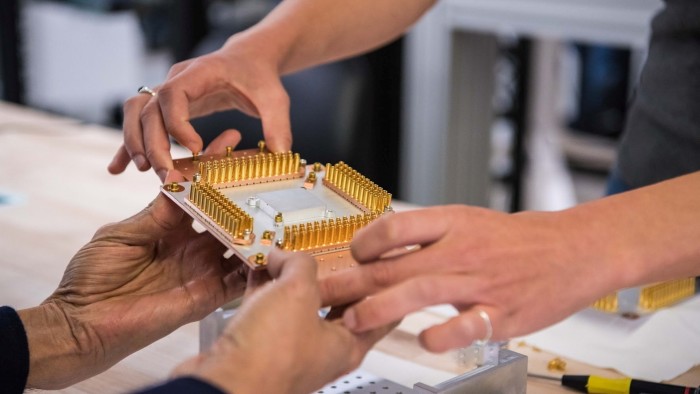Unlock the Editor’s Digest for free
Roula Khalaf, Editor of the FT, selects her favourite stories in this weekly newsletter.
PsiQuantum has raised $1bn in the largest funding round for a quantum computing start-up, intensifying the race to commercialise a technology that promises the computing power needed to solve some of the most difficult scientific problems.
The deal caps a burst of investment and soaring valuations for quantum companies this year, despite warnings from some experts that a truly useful quantum machine could still be decades away.
The US company said the cash would help it build a quantum computer by 2028 with 1mn quantum bits, the basic units that encode information, far more than the hundreds of qubits in today’s most advanced machines.
The ambitious timeframe could put it ahead of Google and IBM, which are in a race to build a full-scale quantum system by the end of this decade.
A computer that big would be able to solve “commercially valuable problems that nobody else on the planet will ever solve” without a quantum machine, said Peter Shadbolt, PsiQuantum’s chief scientific officer.
Quantum computers could help unlock scientific breakthroughs such as developing new materials and drug discovery.
PsiQuantum said the deal valued the company at $7bn, including the funding, compared to a $3.2bn valuation when it last raised money in 2021.
The latest funding highlights the broadening interest among investors as the promise of workable quantum machines comes closer to reality.
It was led by BlackRock, Temasek and Baillie Gifford, along with a slate of new investors that included Nvidia’s venture capital arm.
The chipmaker’s backing comes despite a warning from chief executive Jensen Huang earlier this year that a workable quantum computer could still be 20 years away.
Quantum machines are expected to perform specialised calculations alongside supercomputers running Nvidia’s GPUs, leading the AI chips group to work closely with a number of quantum companies, including PsiQuantum.
The investment comes after rival Quantinuum this month announced a $600mn fundraising at a $10bn valuation, while Finnish company IQM raised $300mn.
The investments mirror a burst of enthusiasm in the stock market that began late last year and accelerated with a series of recent technical breakthroughs in the field.
Three publicly traded companies in the US that are trying to build quantum systems, IonQ, Rigetti and D-Wave, have seen their combined stock market value jump to $22bn, from less than $5bn in November.
Start-ups such as PsiQuantum are also in a race with some of the biggest and best-funded tech companies, including Amazon and Microsoft.
However, the field as a whole still faces steep technical challenges.
Google is the only company to have shown it can control the “noise” that builds up inside a quantum system and drowns out calculations as more qubits are added, a critical hurdle known as error correction.
Shadbolt pointed to Google’s achievement as the most important in a number of breakthroughs that had ignited interest in the industry and raised hopes for practical quantum machines.
“There were people who said physics will conspire against you to stop this from happening,” he said. “The whole field of quantum computing has been emboldened by some of these recent results.”
PsiQuantum, which was founded in the UK nine years ago before moving to Silicon Valley, has placed a bet on a different core technology to most other quantum computers.
Recommended
Its qubits are based on photons rather than the electrons and atoms. The company claims its quantum chips based on photons are easier to manufacture in existing chip facilities, giving it a quicker path to reaching large scale. Its systems also don’t need to operate at the extremely low temperatures required by companies like Google and IBM, greatly reducing the cryogenic equipment needed.
Luke Ward, an investment manager at Baillie Gifford, which first invested six years ago, said PsiQuantum had “hit all their technical milestones”, greatly reducing the technical risks and making it more like a traditional semiconductor investment. “Now they don’t have to invent any new devices or any new science, it’s about integrating what they have.”
PsiQuantum has still faced daunting technical hurdles, including inventing components capable of emitting and controlling single photons. It has yet to show it can handle error correction. The company missed a five-year goal it set to build a full-scale machine by 2024.
The company said it expected to begin construction on its first full-scale site later this year in Australia, where it has received government equity and loan commitments of A$940mn ($619). It also has agreements to build a full-scale quantum system in Chicago.


